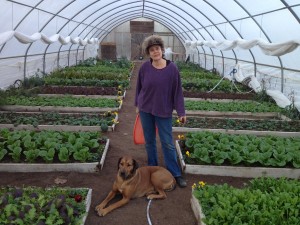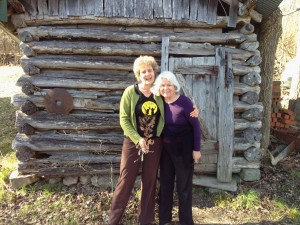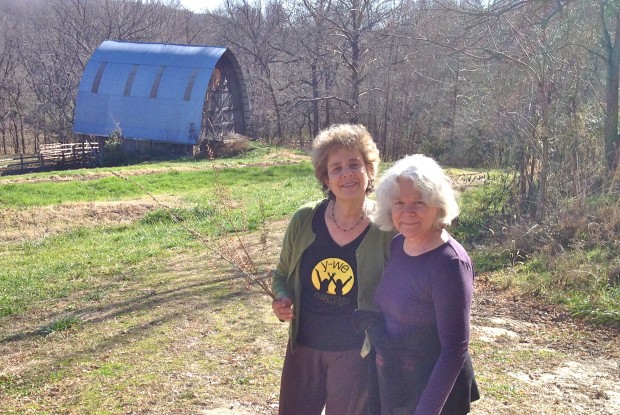Though trained as a doctor, my wife Sally has always been a farmer at heart. She is a person of boundless energy who rarely stops moving, except when she is in her garden. When her hands are in the dirt, Sally drops into another zone completely, and can lose herself in samadhi for hours. She is a healer to others, but this is how she heals herself.

This Thankgiving we traveled to Elixir Farm, a place deep in the Ozarks of Southern Missouri that kept Sally sane during her years of medical residency training in Little Rock. Sally and I were married at Elixir Farm almost two decades ago, and we have always wanted to make the journey back here for Thanksgiving.
Elixir is a small biodynamic organic farm at the end of a six-mile dirt road, an hour's drive from the nearest town. It is nestled in the Ozark hills along the fertile banks of Bryant Creek, and surrounded by Ozark Regional Land Trust lands.
 For forty years, Elixir has been run by Vinnie McKinney, one of Sally's closest friends. She is a woman of uncommon vision and tenacity who bought the place for a song in 1972 at the height of the back-to-the-land movement, and has kept it alive through thick and thin, both as a haven for young farm interns, and as a pilgrimage site for an impressive network of thinkers, scholars, activists and progressive philanthropists. These days Vinnie and her partner Daniel run Elixir as a tidy little farmstead and organic beef operation that provides top quality produce and beef to farmer's markets in St. Louis.
For forty years, Elixir has been run by Vinnie McKinney, one of Sally's closest friends. She is a woman of uncommon vision and tenacity who bought the place for a song in 1972 at the height of the back-to-the-land movement, and has kept it alive through thick and thin, both as a haven for young farm interns, and as a pilgrimage site for an impressive network of thinkers, scholars, activists and progressive philanthropists. These days Vinnie and her partner Daniel run Elixir as a tidy little farmstead and organic beef operation that provides top quality produce and beef to farmer's markets in St. Louis.

At Vinnie and Daniel's urging, I gave a talk last night to local community members at a tiny church in Brixey. MO. Several members of the Ozark Bioregional Congress were in attendance, and I spoke about the Cascadia and Salish Sea bioregions that hold in common with the Ozarks a deep place-based identity. Before long the stories were flowing – stories of how people came here, what drew them, why they've stayed, how things have changed, and more importantly, why so many younger folks are leaving. The Ozarks epitomize many of the dilemmas facing ecologically rich, but economically poor and culturally isolated places in this country. The population is aging, and losing the skill base needed to sustain a vibrant bio-regional and place-based way of life. Social media is radically altering and eroding forms of participation that have held local community in the past. As more children grow up and head for the cities, older retirees from urban centers who lack the needed skills for a self-reliant way of life are moving in to take their places. This drives up land prices without bringing in any new economic base. The vibrant grassroots organic farming culture that is training a new generation of farmers is concentrated near urban centers, where younger farmers can partake of both urban and rural lifestyles. Idyllic as it is, Elixir Farm is too isolated to meld easily into this emerging farm culture. And the generation of back-to-the-landers who thrived here is aging and moving on. Add to that the intense summer heat and growing drought conditions that climate change is bringing to this region, and the trends look daunting.
We moved from there into a spirited conversation about resilient and thriving communities. What might that look like here, given the trends and realities on the ground? Where are threads of resilient community still happening in this neck of the Ozarks, and how can they be strengthened and nurtured? Mostly what buoyed our spirits during these conversations was the hunger for being together in just this kind of way - sharing good stories, giving voice to private hopes and honest concerns, something that is not happening among neighbors here nearly as often as it used to. Along the way the guitars came out, including mine, and some surprisingly good harmonies began to flow. Laughter and pleasure blended with conversation that showed no signs of ending. Good home cooked desserts were served, and it became the kind of celebration of community we are all looking for, continuing long after the formal presentation had ended.
It was as if a dam had broken. A sense of community whose loss was being grieved erupted unexpectedly out of the richness of the moment at hand. A sense of love for the place that continues to hold this community through its many changes became palpable again.
All this was a great reminder to me of how community can rise spontaneously out of the needs of the moment. I tend to get stuck in my too-serious side, and just hearing people's stories lightened me up. A healing spontaneity and sense of humor can be counted on to find its way into real storytelling. On the wings of story, big challenges don't seem quite so daunting, and our sense of isolation is broken. I was also reminded how music can unlock the pleasure of shared company. I'm promising myself, as a Thanksgiving gift, to bring more music and storytelling into my own community when I return home.
